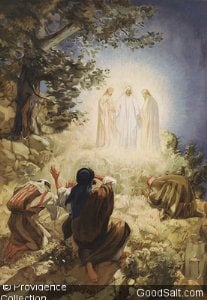Tuesday: The Biblical Evidence
 The early believers, no doubt, had obstacles to overcome as they committed themselves to spreading the good news about Jesus. Not the least of these obstacles would have been that most were untrained in the religious schools of the day, and, therefore, would have had little or no credibility in the eyes of the established church.1
The early believers, no doubt, had obstacles to overcome as they committed themselves to spreading the good news about Jesus. Not the least of these obstacles would have been that most were untrained in the religious schools of the day, and, therefore, would have had little or no credibility in the eyes of the established church.1
Nevertheless, in spite of all obstacles, the apostles and other believers felt strongly called by God to continue in evangelism and witnessing. The blessings of forgiveness and assurance that they had personally experienced compelled them to share. Witnessing was a natural result of conversion.
Read Acts 13:1–49. What work did the Holy Spirit call Barnabas and Saul to do?
The “Word of God” that was preached everywhere most certainly included the messianic passages of the Old Testament. Those Scriptures that foretold the death and resurrection of the Savior, and His consequent forgiveness and justification of sinners, were presented as being fulfilled in Jesus of Nazareth.
The New Testament clearly reveals what the early believers committed themselves to preaching and sharing. Among their regularly emphasized main points were Jesus as Lord and Christ, salvation through His righteousness, the coming kingdom of God, and the promise of eternal life.
Study Acts 6:1–7. Focus particularly on verses 4 and 7. What enabled the early church to have so much evangelistic success with the professional clergy in Jerusalem?
Many people believed in Jesus and accepted Him as their personal Savior because of the testimonies of believers who shared their own life-changing experiences and not simply because people had observed miraculous events.
However powerful and compelling the testimonies and witness of these first evangelists, these people were constantly referring to the Scriptures. That is, they were using the Bible to interpret their experiences. How well do you know the Bible, and how can you get firmly enough grounded in it to be able to use it in your own witnessing?

We as a faith must pray more ernestly. We must share our experiences with others. Holding them and not sharing does not help anyone. It’s our experience that makes us stronger. This is what sharing the gospel means..
As a Christian, you are to witness with truth, honesty, and integrity. As the Lord provides the opportunity, you should respond in a humble and gentle spirit (2 Tim. 2:24). And in that, you should point people to Jesus. It is He alone who saves. If you know that God’s Word will accomplish what God desires, that the gospel is powerful to save, and that it is Jesus who draws all men to Himself, then you should realize that the responsibility of salvation does not rest on you, but on God. You are the teacher, the deliverer of good news. “How shall they believe in Him who they have not heard?” (Rom. 10:14). You help them hear!
It is not our power who can change people, but is is His Gospel that is powerful. Witnessing without solid foundation from the Bible (Word of God) is useless. God is the center of our faith, Jesus is the only one reason why we have the opportunity to live eternally.
Alex, I agree with most of what you are saying. However, the bit of the lesson that gave me much encouragement is the point made that we do not have to be ‘biblical scholars’ in order to witness or to be a witness. With the little knowledge and truth that I have, my experiences and Christ’s involvement in those experiences are powerful! I can walk up to any theologian or person who knew my former circumstances and say, “Look what God has done for me! You know the way I was before! ‘Doesn’t someone who can render such a positive change in my life merit some thought?” I think this is the ultimate power of a personal testimony.
Yeah, I agree Renee. We don’t need to be someone else in order to witness about our living God. God uses ordinary people. Ordinary people who are pure in heart and people who believe that Jesus can transform there life to touch the life of others. The only qualification i know that God need to witness for Him is “Making God our All and in All”.
Maybe to God there are no ordinary people.
Hastening his coming in preaching is demanding but we are too weak.